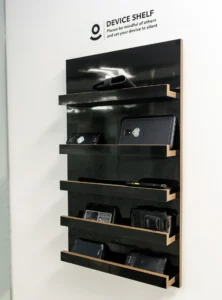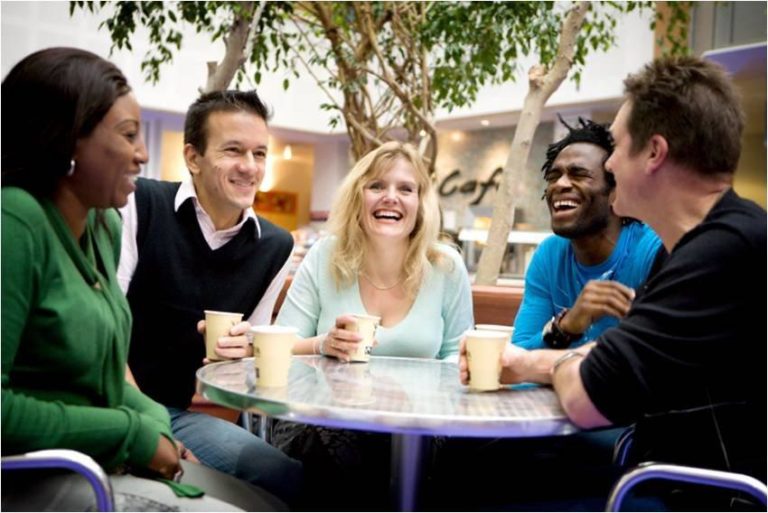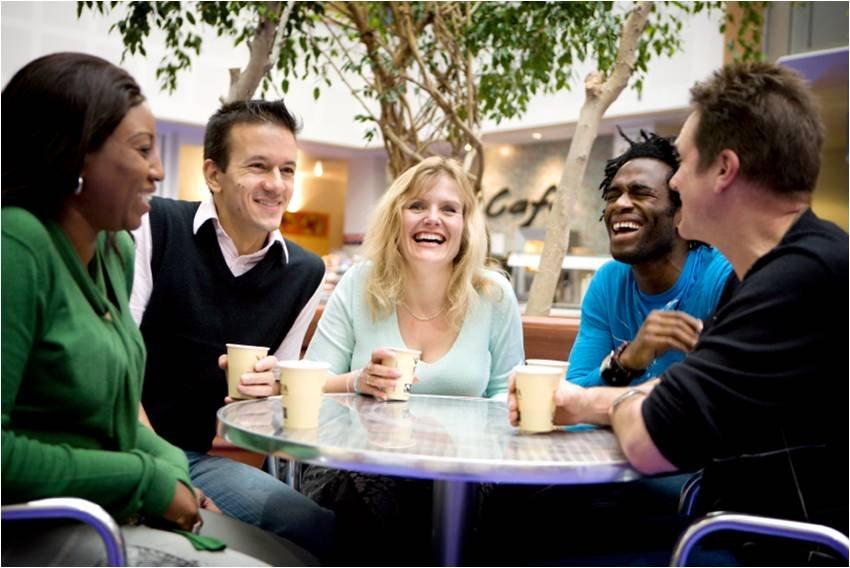Word-Of-the-Week #1021: Connection
February 29, 2024 by Susan Clarke · Comments Off on Word-Of-the-Week #1021: Connection
Connection – the act of creating a relationship.
When was the last time you had a meaningful conversation with someone in person? How much time each day do you spend on your smartphone? Would you like to sleep better, feel more productive at work and have more meaningful communications?
This week Kashmir Hill’s “A Practical Guide to Quitting Your Smartphone. Readers who have taken the plunge said it had improved their lives, marriages and mental health, and offered advice to those going without their smartphones for “Flip Phone February” felt like a great follow up to last week’s WOW.
“Last May, Fabuwood, a kitchen cabinet manufacturer in Newark, instituted a new company policy: No phones allowed during meetings.
To enforce it, the company installed “device shelves” outside each of its six glass-walled conference rooms. On a recent Wednesday morning, there were animated meetings in three of the conference rooms, and the shelves outside were full of smartphones, tablets and ’90s-style flip phones. The 1,200-person company pays the cost of a flip phone for employees who give up their smartphone, and 80 people have acted on the offer.
Surprisingly, employees say they like it. Rena Stoff, a project manager, said that while at first she hated the idea of being deprived of her smartphone, she found that it had made meetings — that she once found boring and unnecessary — engaging and productive.
“Having the phone away from me has almost made my brain more open to information,” she said.
Fabuwood’s founder and chief executive, Joel Epstein, was motivated by his personal belief that smartphones are “destroying our personal and professional lives.”
He started using a flip phone seven years ago after developing carpal tunnel symptoms in his hands from near-constant use of his BlackBerry. He said he slept better, felt more productive at work and had more meaningful communications. Mr. Epstein, a Hasidic Jew, said his choice of device was not unusual in the ultra-Orthodox Jewish community, which encourages the use of “kosher phones” with limited internet access.
Last year, Mr. Epstein queried Fabuwood managers on how often their workers were on their phones; they estimated two hours per day on average. He asked a warehouse safety officer, whose job typically entails monitoring for unsafe conditions, to secretly document each time he saw an employee using a phone in the office. Mr. Epstein said many of the company’s poorest performers were on the list.
Mr. Epstein decided to fight back against the devices competing for his employees’ time and attention with an “InFocus” initiative, asking workers to keep personal devices out of sight while on the job. No one is punished for violating the rule, but managers will email reminders when they notice any backsliding.
There was some grumbling when the initiative was proposed, with some predicting that people would quit. But that didn’t happen, Mr. Epstein said. Instead, poor performers improved. “Within six months, productivity was up 20 percent,” he said, citing internal corporate metrics.
What surprised him most, he said, was the steady stream of messages from employees saying the program was life-changing.
- Team Flip Phone
I heard about Fabuwood’s initiative after I published an article about fighting my own iPhone addiction by switching to a flip phone for a month. Abraham Brull, a manager of software development at Fabuwood, emailed me saying that he had struggled with his smartphone dependence in the past and that it had helped him to join a company that encouraged healthier technology use.
His was among hundreds of emails I received. Many were from flip phone enthusiasts who disagreed with my suggestion that using a “dumb phone” indefinitely wasn’t an option. Long-term flip phone users of all ages and professions said that their lives were better without smartphones, and that their marriages, relationships with their children and mental health had flourished as a result.
Alba Souto, 29, from Spain, said not having a smartphone had made her relationship with her husband, who also switched to an old Nokia, “more mysterious and exciting.”
“Not having access to each other at all times via messaging apps has improved the quality of the time we spend together,” she wrote in an email. “We have more to talk about.”
“I love it,” wrote Christopher Casino, 29, of Brooklyn, who switched in October to a Cat flip phone that gives him access to Uber, Maps and Spotify, but not to social media or news apps. “I do my hobbies more consistently. I read on the subway. I talk to my husband more. I don’t feel the crushing pressure of knowing everything instantly and saying the perfect thing online.”
- Advice for ‘Flip Phone February’
Sarah Thibault, 43, an artist in Los Angeles, said she planned to participate in “Flip Phone February,” an idea that I proposed to follow Dry January. She was inspired to give up her smartphone by a viral video of a crowd of phones ringing in the new year in Paris.
She created a Flip Phone February community on Reddit to share messages and tips with other participants. I joined and posted a link to a contest that Siggi’s Yogurt recently announced offering $10,000, flip phones, smartphone lockboxes and, of course, free yogurt to 10 people who commit to a monthlong digital detox. The company’s spokeswoman told me that 322,935 people had entered the contest.
- The Downsides
Those who make the switch be warned: There were quite a few complaints in my inbox about our increasingly smartphone-centric world.
“The issue that is most disturbing to me, and one that I wish that journalists and regulators would turn their attention to, is the ever-increasing need to have a smartphone to navigate daily life,” wrote a 47-year-old father with no mobile phone at all. “Ten years ago, lacking a phone meant some minor social challenges; nowadays, it can be hard to go through ordinary life.”
He has been frustrated by the now common use of QR codes to get into sporting events and to view restaurant menus. He and many others said payment machines at parking lots often directed people to pay via a smartphone.
“I just got a parking ticket this week because I couldn’t go online and pay via their QR code or app,” wrote a 31-year-old Missouri mother with a flip phone. But she said it was worth it.
“Even in these moments I wouldn’t go back to the smartphone. I am done being enslaved to a piece of tech that has robbed me and my kids of my attention,” she wrote. “Your child-raising years are short. Your kids NEED YOU. Want to be a good mom? Want to raise healthy kids? The best thing you can do is throw your smartphone into the toilet, even for a short while.”
(But don’t actually throw your smartphone in the toilet. You might need to connect it to Wi-Fi at some point to get a two-factor authentication code.)
Some readers, such as one corporate executive and mother of three, said they “could never go flip.”
“The invention of the smartphone has enabled work-life integration in ways I couldn’t imagine!” she wrote.
She said her hacks for making it less addictive included turning off notifications and deleting social media apps. She and others thanked me for pointing to a study that found switching a smartphone from color to gray scale mode helped people significantly reduce their screen time. “Pumped about the grayscale tip,” she wrote, “turning that on today!”
For those who are wondering, I’ve now been using my flip phone as my main phone for two months. But I did get a second line for my smartphone to use when access to the internet is a necessity. I’m not sure, for example, that I would have been able to find Fabuwood’s headquarters — on unfamiliar roads in industrial Newark — without it.
This week’s focus is on connection. How would it feel to disconnect to better connect with those around you? How many people do you know that are “addicted to their phones?” Do you realize how important relationships are in adding to your overall happiness?
I LOVE feedback! Join my Facebook community on my FUN-damentals Fan Page.
Word-Of-the-Week #932: Connection
June 16, 2022 by Susan Clarke · Comments Off on Word-Of-the-Week #932: Connection
Connection – the act of creating a relationship.
When was the last time you had a meaningful conversation with someone in person? How much time each month do you spend helping others? Do you realize how important relationships are in adding to your overall happiness?
Here are more excerpts on “The Habits Of Supremely Happy People” from The Huffington Post.
Martin Seligman, the father of positive psychology, theorizes that while 60 percent of happiness is determined by our genetics and environment, the remaining 40 percent is up to us. And he says happy people have habits you can introduce into your everyday life that may add to the bigger picture of bliss.
- They devote some of their time to giving.
Even though there are only 24 hours in a day, positive people fill some of that time doing good for others, which in return, does some good for the do-gooders themselves. A long-term research project called Americans’ Changing Lives found a bevy of benefits associated with altruism: “Volunteer work was good for both mental and physical health. People of all ages who volunteered were happier and experienced better physical health and less depression,” reported Peggy Thoits, the leader of one of the studies.
Givers also experience what researchers call “the helper’s high,” a euphoric state experienced by those engaged in charitable acts. “This is probably a literal “high,” similar to a drug-induced high,” writes Christine L. Carter, Ph.D. “The act of making a financial donation triggers the reward center in our brains that is responsible for dopamine-mediated euphoria.”
- They nix the small talk for deeper conversation.
Nothing wrong with shootin’ the you-know-what every now and then, but sitting down to talk about what makes you tick is a prime practice for feeling good about life. A study published in Psychological Science found that those who take part in more substantive conversation and less trivial chit chat experienced more feelings of satisfaction.
“I wish I’d had the courage to express my feelings,” is one of the top five regrets of the dying — a sentiment that hints at the fact that people wish they’d spent less time talking about the weather and more time delving into what it is that makes their heart swell.
- They make a point to listen.
“When you listen you open up your ability to take in more knowledge versus blocking the world with your words or your distracting thoughts,” writes David Mezzapelle, author of Contagious Optimism. “You are also demonstrating confidence and respect for others. Knowledge and confidence is proof that you are secure and positive with yourself thus radiating positive energy.” Good listening is a skill that strengthens relationships and leads to more satisfying experiences. A good listener may walk away from a conversation feeling as if their presence served a purpose, an experience that is closely connected with increased well-being.
- They uphold in-person connections.
It’s quick and convenient to text, FaceTime and tweet at your buddies. But spending the money on a flight to see your favorite person across the country has weight when it comes to your well-being. “There’s a deep need to have a sense of belonging that comes with having personal interactions with friends,” says John Cacioppo, Ph.D., the director of the Center of Cognitive and Social Neuroscience at the University of Chicago. Social media, while it keeps us in touch, doesn’t allow us to physically touch, which harvests the warm-and-fuzzies and even decreases feelings of anxiety.”
This week’s focus is on connection. How open and receptive are you to listening to those around you? When is the last time you took a trip to see a special friend? How often do you express your deepest true feelings?
I LOVE feedback! Join my Facebook community on my FUN-damentals Fan Page.
Word-Of-the-Week #834: Connection
July 30, 2020 by Susan Clarke · Comments Off on Word-Of-the-Week #834: Connection
Connection – the act of creating a relationship.
When was the last time you had a meaningful conversation with someone in person? How much time each month do you spend helping others? Do you realize how important relationships are in adding to your overall happiness?
Here are more excerpts on “The Habits Of Supremely Happy People” from The Huffington Post.
Martin Seligman, the father of positive psychology, theorizes that while 60 percent of happiness is determined by our genetics and environment, the remaining 40 percent is up to us. And he says happy people have habits you can introduce into your everyday life that may add to the bigger picture of bliss.
- They devote some of their time to giving.
Even though there are only 24 hours in a day, positive people fill some of that time doing good for others, which in return, does some good for the do-gooders themselves. A long-term research project called Americans’ Changing Lives found a bevy of benefits associated with altruism: “Volunteer work was good for both mental and physical health. People of all ages who volunteered were happier and experienced better physical health and less depression,” reported Peggy Thoits, the leader of one of the studies.
Givers also experience what researchers call “the helper’s high,” a euphoric state experienced by those engaged in charitable acts. “This is probably a literal “high,” similar to a drug-induced high,” writes Christine L. Carter, Ph.D. “The act of making a financial donation triggers the reward center in our brains that is responsible for dopamine-mediated euphoria.”
- They nix the small talk for deeper conversation.
Nothing wrong with shootin’ the you-know-what every now and then, but sitting down to talk about what makes you tick is a prime practice for feeling good about life. A study published in Psychological Science found that those who take part in more substantive conversation and less trivial chit chat experienced more feelings of satisfaction.
“I wish I’d had the courage to express my feelings,” is one of the top five regrets of the dying — a sentiment that hints at the fact that people wish they’d spent less time talking about the weather and more time delving into what it is that makes their heart swell.
- They make a point to listen.
“When you listen you open up your ability to take in more knowledge versus blocking the world with your words or your distracting thoughts,” writes David Mezzapelle, author of Contagious Optimism. “You are also demonstrating confidence and respect for others. Knowledge and confidence is proof that you are secure and positive with yourself thus radiating positive energy.” Good listening is a skill that strengthens relationships and leads to more satisfying experiences. A good listener may walk away from a conversation feeling as if their presence served a purpose, an experience that is closely connected with increased well-being.
- They uphold in-person connections.
It’s quick and convenient to text, FaceTime and tweet at your buddies. But spending the money on a flight to see your favorite person across the country has weight when it comes to your well-being. “There’s a deep need to have a sense of belonging that comes with having personal interactions with friends,” says John Cacioppo, Ph.D., the director of the Center of Cognitive and Social Neuroscience at the University of Chicago. Social media, while it keeps us in touch, doesn’t allow us to physically touch, which harvests the warm-and-fuzzies and even decreases feelings of anxiety.
This week’s focus is on connection. How open and receptive are you to listening to those around you? When was the last time you connected with a special friend? How often do you express your deepest true feelings?
I LOVE feedback! Join my Facebook community on my FUN-damentals Fan Page.
Word-Of-the-Week #625: Connection
July 27, 2016 by Susan Clarke · Comments Off on Word-Of-the-Week #625: Connection
Connection – the act of creating a relationship.
When was the last time you had a meaningful conversation with someone in person? How much time each month do you spend helping others? Do you realize how important relationships are in adding to your overall happiness?
Here are more excerpts on “The Habits Of Supremely Happy People” from The Huffington Post.
Martin Seligman, the father of positive psychology, theorizes that while 60 percent of happiness is determined by our genetics and environment, the remaining 40 percent is up to us. And he says happy people have habits you can introduce into your everyday life that may add to the bigger picture of bliss.
- They devote some of their time to giving.
Even though there are only 24 hours in a day, positive people fill some of that time doing good for others, which in return, does some good for the do-gooders themselves. A long-term research project called Americans’ Changing Lives found a bevy of benefits associated with altruism: “Volunteer work was good for both mental and physical health. People of all ages who volunteered were happier and experienced better physical health and less depression,” reported Peggy Thoits, the leader of one of the studies.
Givers also experience what researchers call “the helper’s high,” a euphoric state experienced by those engaged in charitable acts. “This is probably a literal “high,” similar to a drug-induced high,” writes Christine L. Carter, Ph.D. “The act of making a financial donation triggers the reward center in our brains that is responsible for dopamine-mediated euphoria.”
- They nix the small talk for deeper conversation.
Nothing wrong with shootin’ the you-know-what every now and then, but sitting down to talk about what makes you tick is a prime practice for feeling good about life. A study published in Psychological Science found that those who take part in more substantive conversation and less trivial chit chat experienced more feelings of satisfaction.
“I wish I’d had the courage to express my feelings,” is one of the top five regrets of the dying — a sentiment that hints at the fact that people wish they’d spent less time talking about the weather and more time delving into what it is that makes their heart swell.
- They make a point to listen.
“When you listen you open up your ability to take in more knowledge versus blocking the world with your words or your distracting thoughts,” writes David Mezzapelle, author of Contagious Optimism. “You are also demonstrating confidence and respect for others. Knowledge and confidence is proof that you are secure and positive with yourself thus radiating positive energy.” Good listening is a skill that strengthens relationships and leads to more satisfying experiences. A good listener may walk away from a conversation feeling as if their presence served a purpose, an experience that is closely connected with increased well-being.
- They uphold in-person connections.
It’s quick and convenient to text, FaceTime and tweet at your buddies. But spending the money on a flight to see your favorite person across the country has weight when it comes to your well-being. “There’s a deep need to have a sense of belonging that comes with having personal interactions with friends,” says John Cacioppo, Ph.D., the director of the Center of Cognitive and Social Neuroscience at the University of Chicago. Social media, while it keeps us in touch, doesn’t allow us to physically touch, which harvests the warm-and-fuzzies and even decreases feelings of anxiety.
This week’s focus is on connection. How open and receptive are you to listening to those around you? When is the last time you took a trip to see a special friend? How often do you express your deepest true feelings?
I LOVE feedback! Join my Facebook community on my FUN-damentals Fan Page.
Word Of the Week #7: Connection
April 20, 2009 by Susan Clarke · Comments Off on Word Of the Week #7: Connection
Connection: coming into or being put in contact for the purpose of a relationship.
Each person has his/her own personality leaving a unique, individual, impression with certain people; these are people that feel an emotional connection to you. That’s the beginning of a developing relationship.
You have relationships with people at home and at work, in your favorite coffee shop or restaurant. When you want to create a connection, all you have to do is focus your attention on that person. Listen more carefully or get more personal. The more attention, the deeper the connection.
Think about how you can create a deeper connection with everyone this week. What behavior are you displaying and how does it make you feel? Are the people around you responding differently?
Reader Responses
“Thought for the day: I think that what’s important is to base one’s convictions on compassion for others and an ambitious sense of the possible…..Life is facing challenges, going through them, and getting to the other side.” — John Beck
“Since my business is virtual, I do a lot of networking on Ryze and through groups like the IVWCC (International Virtual Women’s Chamber of Commerce). I make it a point to send private messages or emails to the people I’m interested in networking with, and have developed some great business and personal relationships by connecting with others I’ve met online. People do business with, and refer business to, people they know and trust and like.” — Terry L. Green
“Thank you Susan…I like this one, life is short and we only have so much time and sometimes we forget about relationships or simply do not invest the time to learn more about our friends, co-workers and even our loved ones.” — Charles Rich






